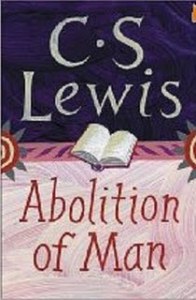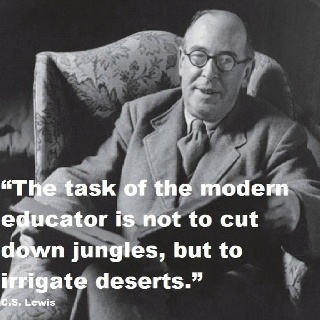 This past week, I reread C. S. Lewis’s The Abolition of Man. Although I have been reminded of quotes from it throughout my life, probably the last time I had read it all the way through was forty years ago. So, I decided, it was time again.
This past week, I reread C. S. Lewis’s The Abolition of Man. Although I have been reminded of quotes from it throughout my life, probably the last time I had read it all the way through was forty years ago. So, I decided, it was time again.
It’s a small book, but packed to the brim with insights on education and worldview. It didn’t start out in book form, but as special talks he gave at a university during WWII; later, it was turned into a book, and we all should be grateful it was.
The first chapter is a witty critique of modern education. What struck me was how the critique continues to hit home after sixty years. One of the most poignant quotes is this:
For every one pupil who needs to be guarded from a weak excess of sensibility there are three who need to be awakened from the slumber of cold vulgarity. The task of the modern educator is not to cut down jungles but to irrigate deserts. The right defence against false sentiments is to inculcate just sentiments. By starving the sensibility of our pupils we only make them easier prey to the propagandist when he comes. For famished nature will be avenged and a hard heart is no infallible protection against a soft head.
I admit I wasn’t sure at first if I agreed with the jungle-desert analogy. Don’t our students have a lot of false ideas that need to be hacked away? Yet those false ideas truly are a desert of the mind and soul. Our students know so little, and what they think they do know is often just propaganda masquerading as education. I think he’s right.
Lewis then aims at the removal of “just sentiments,” or what he would call the things that are really true, pointing out that they are being replaced. We must reject the desert of total subjectivism and come to grips with reality:
It is the doctrine of objective value, the belief that certain attitudes are really true, and others really false, to the kind of things the universe is and the kind of things we are.
In other words, we don’t make this up as we go; there are some bedrock concepts that are demonstrably true, and that have been taught through the ages. Modern education fails when it throws out objective reality. There is truth and there is falsehood, and the distinction between the two should be the basis of education.
I love his summary of what the new educational model is attempting to create:
The difference between the old and the new education will be an important one. Where the old initiated, the new merely “conditions.” The old dealt with its pupils as grown birds deal with young birds when they teach them to fly; the new deals with them more as the poultry-keeper deals with young birds—making them thus or thus for purposes of which the birds know nothing. In a word, the old was a kind of propagation—men transmitting manhood to men; the new is merely propaganda.
Think of all the trendy things in modern education. Our students come to college well versed in environmentalism, radical feminism, and income inequality. They know little or nothing about real history or the proper functioning of government. I know this from experience.
We train students in this way and then wonder why our society is what it is. Lewis sums it up this way:
And all the time—such is the tragi-comedy of our situation—we continue to clamour for those very qualities we are rendering impossible. You can hardly open a periodical without coming across the statement that what our civilization needs is more “drive,” or dynamism, or self-sacrifice, or “creativity.”
In a sort of ghastly simplicity we remove the organ and demand the function. We make men without chests and expect of them virtue and enterprise. We laugh at honour and are shocked to find traitors in our midst. We castrate and bid the gelding be fruitful.
And that’s only chapter 1. More next Saturday. But for now, this reminder:

